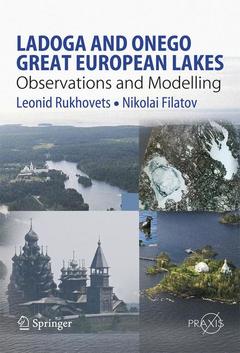Description
Ladoga and Onego - Great European Lakes, 2010
Observations and Modeling
Environmental Sciences Series
Authors: Rukhovets Leonid, Filatov Nikolai
Language: English
Subject for Ladoga and Onego - Great European Lakes:
158.24 €
In Print (Delivery period: 15 days).
Add to cartPublication date: 03-2012
308 p. · 17x24.2 cm · Paperback
158.24 €
Subject to availability at the publisher.
Add to cartPublication date: 10-2009
308 p. · 17x24.2 cm · Hardback
Description
/li>Contents
/li>Biography
/li>Comment
/li>
Lakes Ladoga and Onego are the greatest lakes in Europe. With a surface area of 17891 km2 and a volume of 902 km3, the former is one of the top fifteen world?s freshwater lakes and is only slightly smaller than Lake Ontario. Lake Onego?s surface area is 9600 km2 and it has a volume of 292 km3. The watershed of Lake Ladoga (258000 km2) extends through Northwestern European Russia and the eastern part of Finland, including the large Lakes Ilmen and Saimaa, and together these Great European Lakes are an important link in the Caspian-Baltic-White Sea waterway system. Their ecological state affects the water quality of the Neva River, the Gulf of Finland and the Baltic Sea. Thus any changes affect the operational use, environmental protection and management of water resources of a wide area and concern such issues as drinking, recreation, transport and energy.
The anthropogenic impact on the Lake Onego ecosystem is mostly determined by the sewage waters of the Petrozavodsk and Kondopoga industrial centres, while the river inflow makes the most impact on Lake Ladoga. Although the anthropogenic stress on the water ecosystems of the Great European Lakes has decreased over the last 15 years, there has been some simultaneous evidence of global warming. There is not enough current data to identify the climate-induced changes in lake ecosystems, but there is proof that the main cause of lacustrine ecosystem changes is determined by anthropogenic factors.
Leond Aizikovich Rukhovets, professor, Doctor of Sciences, he started to work in Leningradean Branch of Steklov Mathematical Institute, USSR Academy of Sciences in 1959. In this Branch he worked during the period 1959-1965. The next periods 1965-1975,1975-1985 he was the scientific researcher in Lenigradean Branch of Central Institute of Mathematics and Economics, USSR Academy of Scieces and Leningradean Institute of Social and Economical Problems, USSR Academy of Sciences correspondingly. During period 1986-1990 he worked in Limnological Institute, USSR Academy of Sciences at Leningrad. He received his doctor's degree in computational mathematics in 1970 from Leningradean Branch of Steklov Mathematical Institute of USSR Academy of Sciences. His dissertation was devoted to study the finite element method (FEM) for solution boudary value problems for differential equations with partial derivatives. Later the interest of his investigations was focused upon the computational geophysicalhydrodynamics, models of large lakes circulation, ecosystem models and its implementation in conservation and managemtnt of water resources. In 1990 he was awarded a Doctor of Sciences degree in physics and mathematics. Leonid Rukhovets is the author more than 130 scientific articles and eight books. He took part in conferences and was visiting scientist in Oceanology Institute of Poland Academy of Sciences (Poland,1989), in Finland (1995, 1996, 1998, 2003,2006), USA(1999), Danmark (1999), Estonia (2006), Canada (2007). From 1998 to present Leonid Rukhovets is working in Institute for Economics and Mathematics at St.Petersburg, RAS as Director of Instirute and a head of the laboratory of mathematical modelling. He is a professor of State Marine Technical University.
Nikolai Nikolaevich Filatov , professor, Ph.D., He start work in limnilogical institute, Academy of Sc. and received his doctorate in geography in 1975 from the State University in Leningrad , where he conducted inv




